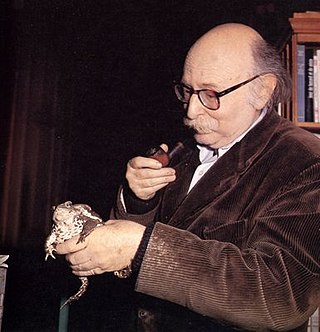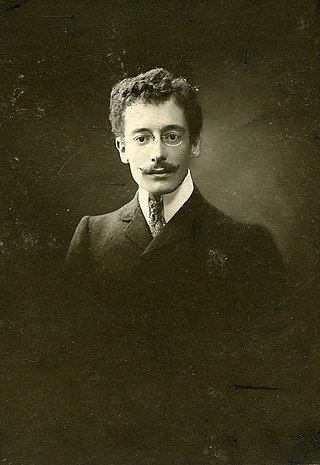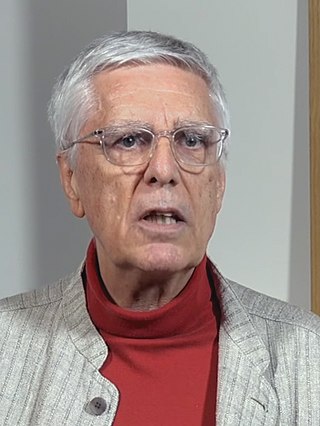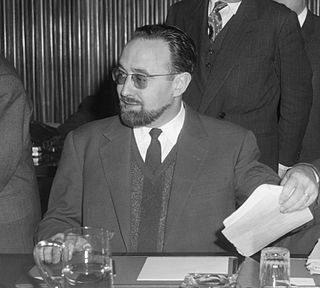Related Research Articles

The Prix Théophraste-Renaudot or Prix Renaudot is a French literary award.

Jean Edmond Cyrus Rostand was a French biologist, historian of science, and philosopher.

Marc Ferro was a French historian.

Victor Segalen was a French naval doctor, ethnographer, archeologist, writer, poet, explorer, art-theorist, linguist and literary critic.

Philippe Desan is Howard L. Willett Professor of French and History of Culture at the University of Chicago. Originally from France, Desan is among the top Montaigne scholars alive today. He received his PhD from the University of California Davis (1984), and has published widely on several topics pertaining to the literature and culture of the French Renaissance, often in relation to their economic, political and sociological context. At the University of Chicago, he has served as Master of the Humanities Collegiate Division and as Chair of the Department of Romance Languages and Literatures. He is the general editor of the Montaigne Studies. He has been awarded numerous honors for his scholarly work, including being named Knight of the Ordre des Palmes Académiques (1994) and awarded the Ordre National du Mérite (2004) and the Ordre des Arts et Lettres (2011). He has also received the Prix de l'Académie Française in 2005, the Grand Prix de l'Académie Française for "le rayonnement de la langue et littérature française" in 2015 and the Prix de l'Académie des Sciences Morales et Politiques for his "Montaigne. Une biographie politique" in 2015.

Jean-Denis Bredin was a French attorney and founding partner of the firm Bredin Prat. He was widely admired as an author-commentator, both for his novels and for his non-fiction works, with a particular focus on recent and contemporary history. On 15 June 1989, he was elected to membership of the Académie Française, becoming the twentieth occupant of seat 3, which had been vacated through the death of Marguerite Yourcenar. His daughter, Frédérique Bredin, served between 2013 and 2019 as President of the French National Center of Cinematography and the moving image.

Elisa Brune was a Belgian writer and journalist. She held a doctorate in environmental science.
Françoise Dolto was a French pediatrician and psychoanalyst.

Edgard Edouard Pisani was a French statesman, philosopher, and writer.

Boris Cyrulnik is a French doctor, ethologist, neurologist, and psychiatrist.
Molière Award for Best Director. Winners and nominees.

Tours station is a railway station serving the city of Tours, Indre-et-Loire department, western France. It is situated on the Paris–Bordeaux railway, the Tours–Saint-Nazaire railway, and the non-electrified Tours–Le Mans railway. The Gare de Tours is a terminus; most TGV trains only serve the nearby Gare de Saint-Pierre-des-Corps.

Georges Chapouthier is a French neuroscientist and philosopher.
Jean Freustié, also known as Jean Pierre Teurlay was a French writer and literary critic. He won the 1969 Prix du roman de la société des gens de lettres, and 1970 Prix Renaudot, for Isabelle ou l'arrière-saison.
Michel Deguy was a French poet and translator.

Gaston-Paul Effa is a writer from Lorraine of Cameroonian origin, also a professor of philosophy.
Nicolas de Blégny was a French essayist, historian and barber surgeon. He was appointed surgeon of Queen Maria Theresa of Spain in 1678, then physician of King Louis XIV in 1682.

Michel Zink is a French writer, medievalist, philologist, and professor of French literature, particularly that of the Middle Ages. He is the Permanent Secretary of the Académie des Inscriptions et Belles-Lettres, a title he has held since 2011, and was elected to the Académie française in 2017. In addition to his academic work, he has also written historical crime novels, one of which continues the story of Arsène Lupin.
Alain Berthoz is a French engineer and neurophysiologist.

Alain Prochiantz is a neurobiology researcher and professor at the Collège de France, of which he became director from 2015 to 2019.
References
- ↑ Cf. Acte de naissance n° 266 en date du 7 juin 1935 du registre des naissances de l'état-civil de la ville de Libourne pour l'année 1935 ; Who's who in France, éd. Jacques Lafitte, 41e édition, 2010, page 2203, où encore Who's who in Sud-Ouest, éd. Jacques Lafitte, 1re édition, 1987, page 225, où les notices rédigées par l'intéressé lui-même mentionnent bien sa naissance à Libourne. Il n'est donc pas né à Castillon-la-Bataille ou Sainte-Foy-la-Grande, comme l'indiquent à tort divers auteurs de publications le concernant.
- ↑ "The Academy of medicine". Fondation de l'Académie de Médecine. Retrieved 2020-04-28.
- 1 2 Pascale Nivelle (26 December 2016). "Jean-Didier Vincent, neurobiologiste, publie son autobiographie génétique. Pour lui, "La vie est une fable". L'être et le vivant". Libération.fr. Retrieved 21 January 2017.
- 1 2 Chercher - Jours après jours, les aventuriers du savoir, éditions Autrement, 2000, ISBN 9782746700550, p. 121-123.
- 1 2 Entretien avec Jean-Didier Vincent dans Le Tête-à-tête de Frédéric Taddeï sur France Culture le 22 janvier 2012.
- ↑ Interview de Jean Didier Vincent par Jacques Paugam sur Canal Académie, 27 février 2011
- ↑ Jean-Didier Vincent, sur histoire.inserm.fr
- ↑ Sébastien Lemerle, « Les habits neufs du biologisme en France », Actes de la recherche en sciences sociale, nos 176-177, 2009, p. 75
- ↑ "Jean-Didier Vincent: "Baisez et tout ira mieux"". Sinemensuel.com. July 2015. Retrieved 21 January 2016.
- ↑ Élisabeth Lévy (13 October 2011). "Jean-Didier Vincent, de l'humain au transhumain". Lepoint.fr. Retrieved 21 January 2017.
- ↑ "Académie des sciences".
- ↑ "Académie nationale de Médecine".
- ↑ "La biologie des Passions".
- ↑ "Casanova la contagion du plaisir".
- ↑ "Celui qui parlait presque".
- ↑ "La Chair et le Diable".
- ↑ L'Art de parler la bouche pleine. ASIN 2879380715.
- ↑ "La vie est une fable".
- ↑ "Qu'est ce que l'Homme".
- ↑ Faust, une histoire naturelle.
- ↑ La dispute du vivant. 2000.
- ↑ Pour une nouvelle philosophie du goût. Odile Jacob. November 2000.
- ↑ "Le cœur des autres : biologie de la compassion".
- ↑ "Voyage extraordinaire au centre du cerveau".
- ↑ Elisée Rectus, géographe, anarchiste, écologiste. ASIN 2221106482.
- ↑ "Le sexe expliqué à ma fille".
- ↑ "Bienvenue en Transhumanie".
- ↑ Le cerveau sur mesure. ASIN 2738127096.
- ↑ Biologie du couple.
- ↑ "Le cerveau expliqué à mon Petit-fils".
- ↑ Eléonore Laloux répond à Jean-Didier Vincent
- ↑ Emmanuel Laloux (12 November 2012). "Non, les trisomiques ne sont pas un "poison dans une famille" !". Lavie.fr. Retrieved 21 January 2017.
- ↑ Libération, 28 mai 2009 « 5500 euros pour avoir traité Le Pen de salopard »